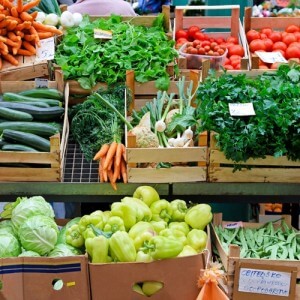5 tips for farmers’ market season

Spring and summertime signals the start of farmers’ market season. These open-air markets provide some of the freshest ingredients to culinary academy students. If you’re new to this mode of shopping, there are some things to keep in mind.
Do your research
Before heading to the market, do a quick search on what’s in season in your area. Not only will this make your choices easier, but it leaves less room for disappointment if you can’t get something you thought would be available. Feel free to talk to the vendors once you’re at the market about what will be in season and attainable in upcoming weeks.
Come prepared
Each market is different, but a good rule of thumb is to bring your own means of transporting your purchases. With an idea in mind of what you’re looking to purchase, you can better decide how best to carry your goods. While lightweight and easy-to-carry tote bags will usually suffice, in warmer temperatures you may want to bring a cooler to store your purchases. Small, reusable plastic bags are great for keeping delicate items, like herbs, safe, and a bottle of water can keep perishable items hydrated throughout your shopping.
Shop around before buying
There’s nothing worse than purchasing something at one stall, only to discover it was cheaper at another later in your tour of the market. If you know what you’re looking for, scope out different vendor’s products for both price and quality. Try not to make an impulse buy without checking out what else is available to you first.
Bring small bills and change
Most vendors are cash-only and sell their goods in dollar or 50 cent increments, so showing up with your change purse is a good idea. Not only will it make your purchasing faster and easier for you, but the farmer will appreciate your preparedness.
Talk to the farmers
Farmers’ markets are a perfect opportunity to find out how the food you’re purchasing is grown from the source. Most farmers are proud of their products and would love to tell you how the background of their operation and goods. Not only will they be able to tell you how their food is grown (organic, use of pesticides, etc), but they’ll be able to tell you how to use it, offering valuable cooking pointers along the way.
Farmers’ markets are great chances for students in culinary arts programs to buy local, fresh products, while also educating themselves on the growing process. Incorporating these seasonal products into their dishes, chefs are guaranteed to have delicious and nutritious meals.


